Brittany. It might sound a lot like Britain, it might only be a short trip across the channel, and there may be many Brits living there, but it's very different from life in the UK.
Known for its spectacular coastline, warm climate, and lush countryside, Brittany is very popular for second-home owners and expats.
The area's reputation precedes it, but what are the truths behind the rumors? This guide to Brittany will tell you everything you need to know about the most north-western part of France.
Secure Peace of Mind with Best-Value International Health Coverage
International Citizens Insurance provide free, no-obligation quotes from the leading international health insurance providers with plans tailored to meet your needs. Trusted by thousands of expats worldwide.
Living in Brittany - an overview
Let's be clear: if you're a city slicker hoping for a taste of the high life, Brittany is not for you.
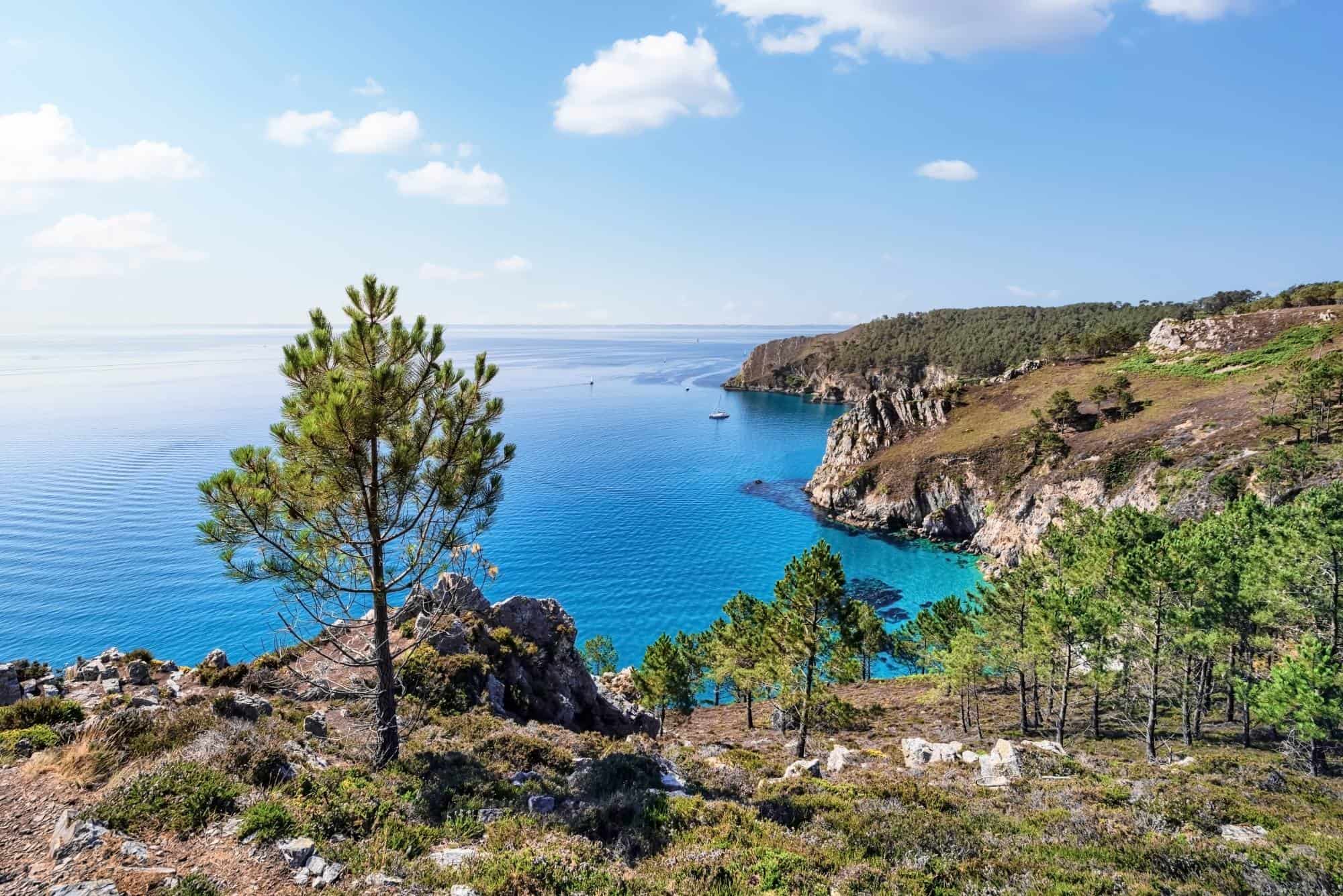
Brittany is rugged, overwhelming, and incredibly charming. But it's not ideal for fans of city life. Most of Brittany is overrun by small villages. Even the most prominent towns still feel like villages. But that doesn't mean the area isn't without its charms.
In fact, if you want to get away from it all, embrace nature, walk along the clifftops and eat local food on the beach, Brittany is a dream. Packed full of fishing villages, farms, and hamlets with stone cottages, it's one of the most beautiful places in France. It's certainly as close as the French get to rolling hills and patchwork fields.
If the appeal of Cornwall and Devon isn't lost on you, Brittany is like someone took all the best bits and removed the pesky seagulls, rain, and cheap tourist traps.
Brittany's coastline is perfect for those who enjoy the sea and like being outdoors. You could spend the rest of your life hiking in Brittany and never get bored.
When you're not outside, Brittany is famous for being a haven for foodies. Of course, there's all the classic French cuisine and plenty of British influence from across the water.
Bretons love to eat and drink, and cider, crêpes, mushrooms, seafood, and pastries are very popular. The food here is part of the Celtic culture, which remains very strong and pairs beautifully with the local music.
Moving to Brittany isn't just about moving abroad and becoming an expat. It's sort of like joining a very unique but large club. Membership is easy to get, and once you're in, you'll never want to leave!
The cost of living in Brittany
Compared with the average cost of living in France, life in Brittany is surprisingly affordable.
The countryside is full of farms selling local fruit, vegetables, and meat, and of course, the friendly fishermen sell restaurant-quality seafood at excellent prices. This means you can eat like a king without spending much.
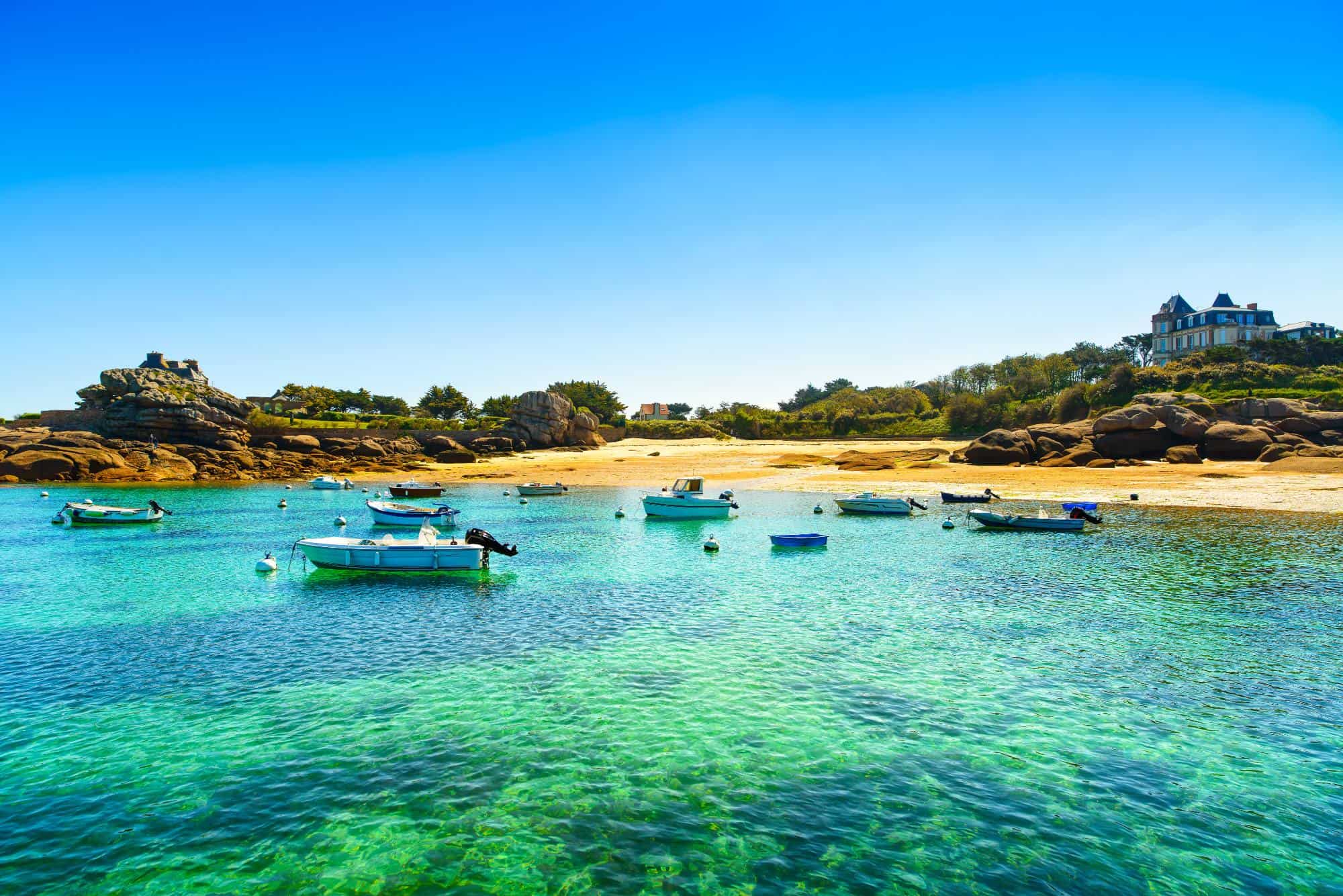
If you want to eat out, you'll find restaurants for every budget. Make a note of which put their price up in the summer months and which are tourist traps. You should eat like a local.
Houses are also reasonably affordable.
When you want a sea view, prices jump, and coastal cottages and stone houses can easily reach over €1 million. But a nice country house in a small village, with a decent garden, can come in at around €100,000.
In other areas of France, this would get you in a tiny, modern villa with no outside space, but in Brittany, you can find some incredible stone houses with land and barns for under €300,000.
Considering buying a home in France? Read our Complete Guide To Buying A Property In France to avoid potential pitfalls and disappointment.
The larger towns of Brest, Rennes, Vannes, and Saint-Malo also offer apartments.
Rent is usually low at between €400-600 per month for a reasonably standard apartment. It's easy to find a good place. However, larger properties are very in demand, so renting tends to be expensive and complicated. If you want a larger property, buying is more straightforward.
You can find more information on renting and how to do it in our guide, Renting A Property In France.
Everything else in Brittany is also fairly standard. It benefits from the French infrastructure, so life is pretty easy-breezy.
The only issue you might find is that you are willing to pay a fortune for good internet, but the remote villages just don't have the lines. Of course, this does save you money because you can't pay for it if it doesn't exist.
If you plan on working in Brittany, the average salary comes in at around €2,500 per month after tax. People here easily live on this amount without worry.
The only thing you'll really need to consider is the costs of running a car. You need your own transport. There is plenty of public transport at an affordable price, but you need a car to actually live there.
Everything else in Brittany is fairly standard for France. There are excellent, affordable public services, from libraries and buses to activity centers and sports clubs.
Public schools are amazing, and there are many jobs thanks to the number of tourists, so whether you're moving with the kids or looking to retire to France, Brittany can cater to your needs.
Where to live in Brittany
Brittany is well-known for having a very specific microclimate. The Atlantic coastline makes for some beautifully warm, humid weather, while the northern coast onto the channel brings in some cooler air.
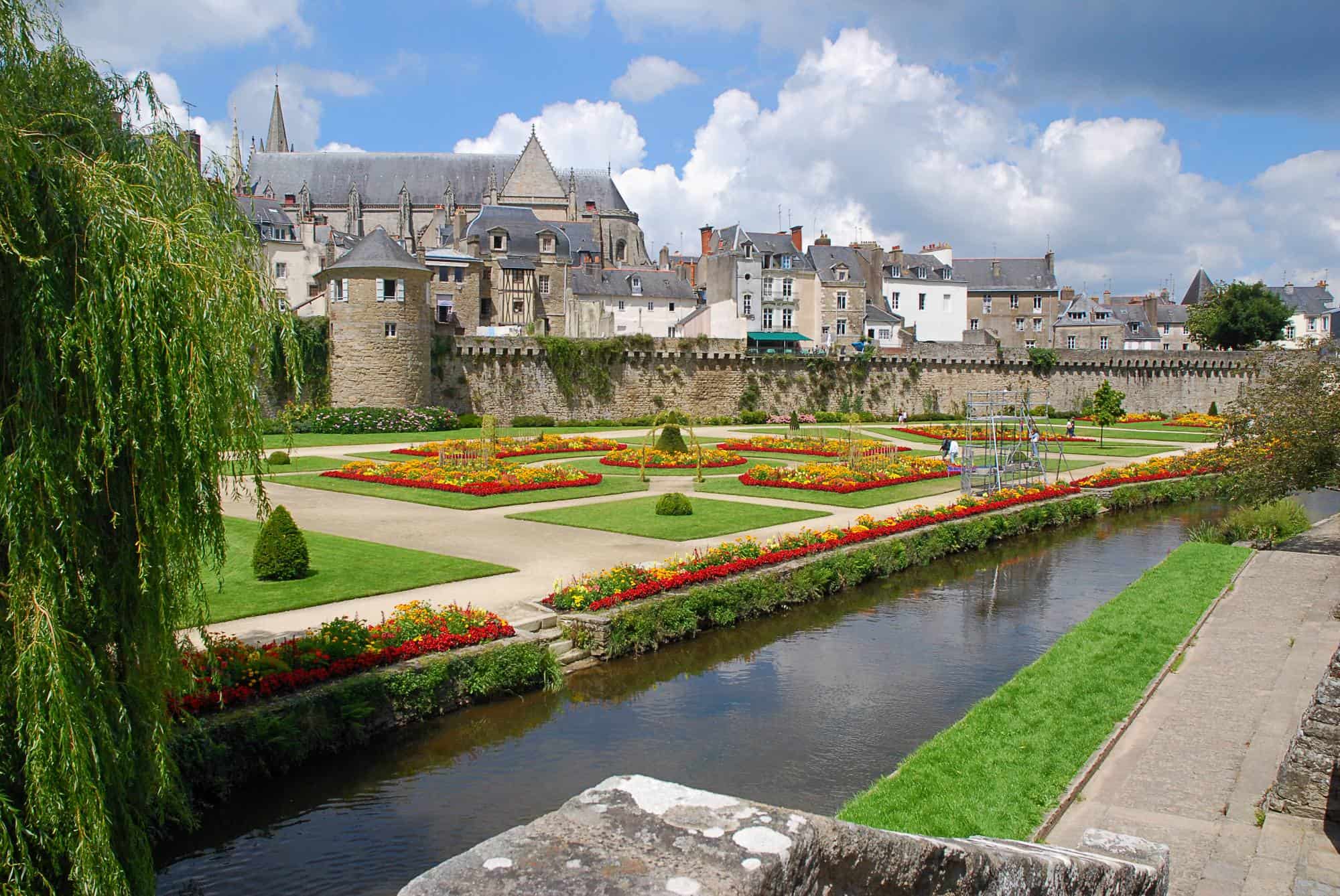
Depending on what you are looking for, you could get it very wrong or very right. Here are our favorite places to live in Brittany.
Vannes
Vannes feels like another world. The town was a Roman fort and still retains plenty of old buildings, windy streets, and cramped pubs.
It's as stunning and historic as they come. It's set in the middle of a national park called the Golfe du Morbihan, and the other side is bordered by the sea, meaning no matter where you look or drive, it's beautiful. It's also a great place to buy cider and cheese!
If you love the idea of Vannes, you might want to read our guide on living in Vannes is an expat. It has all the information you need to consider before moving to this wonderful town.
Dinan
Right next to Saint-Malo but without the hustle, bustle, and ferries. Dinan is a picture-perfect stone village. It's very artistic, with all sorts of festivals, fairs, and markets.
Houses can be pricey, but the place strikes the perfect balance of busyness even in winter without being too crowded. It's also large enough to offer enough activities to keep you entertained.
Roscoff
Famous as one of the significant ports connecting France to England and Spain, you'd think it would be a very commercial, industrial town. Instead, Roscoff is a beautiful village. It's often overlooked as people usually move through it onto other places.
As a result, it's always busy without being the center of attention. It's affordable, has excellent local pubs and bars, as well as a stunning seafront with beaches.
Rennes
Rennes is the economic hub and beating heart of the area. It's as close to a major city as you'll get in Brittany.
There's always something to do or see, and it has all the amenities and attractions of a larger town. However, it's retained the charms of a much smaller village.
You'll find cobbled streets, coffee shops, wooden buildings, and wonky houses. It's also home to one of France's largest markets every Saturday.
Paimpont
Not far from Rennes, Paimpont is supposed to be where King Arthur and Merlin lived for a while. It's easy to believe as the village and surrounding area is magical and mystical, with a stunning forest.
There's also a beautiful lake. With good connections to Rennes, Paimpont is ideal for anyone who isn't fussed about the seas and loves nature but still wants access to a larger town.
Expats in Brittany
Brittany has one of the largest communities of expats in France. There are even some small villages where the English outnumber the French.
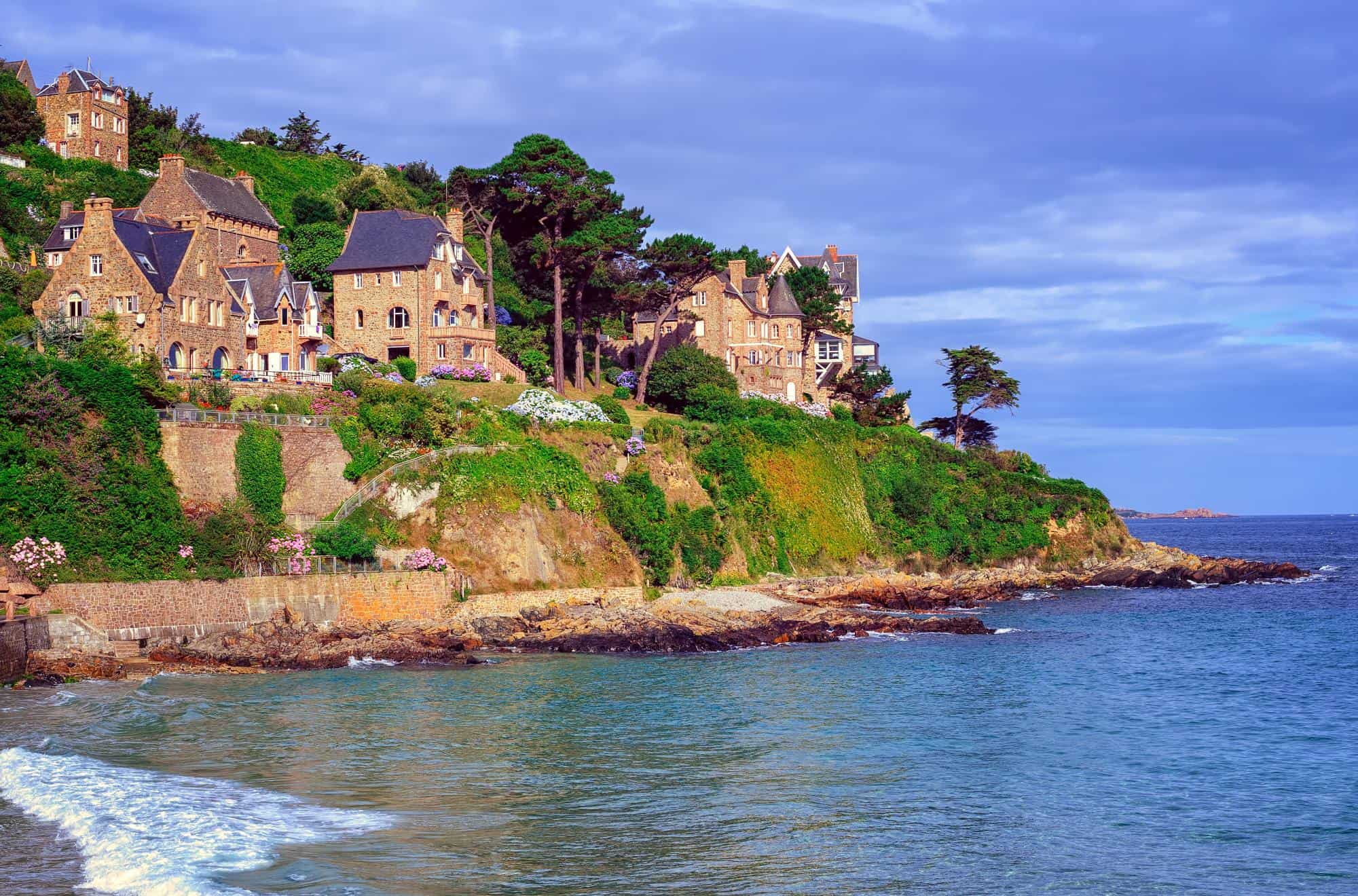
Of course, you'll find many expats from other countries, too, usually drawn to Brittany for surfing. However, the number of Brits is so large that they dwarf any other expat communities and tend to adopt different nationalities as their own.
Like many other areas, you can find online boards, websites, and Facebook groups of expats that can help out with everything from jobs and accommodation to activities and restaurant suggestions.
However, the best place to find expats in Brittany is just to go to Brittany. Noticeboards outside the mayor's offices usually have contact details of local groups of expats. If there aren't any on the board, you can always ask inside.
Most expats choose to live along the coastline near the sea. The property is more expensive, but the views are worth it. Moving inland, expats tend to clump together in villages such as Gouarec. You'll find that expats in Brittany clump together like this in groups and have their own mini expat communities.
In some smaller villages, older French residents are reluctant to welcome expats, fearing one family might be the invading force or a larger army. If you move somewhere without many expats, be prepared to embrace the local culture and language to win over your neighbors.
Things to know before you move to Brittany
Learn French
It might sound British, but Brittany is, of course, French. This means that French is the official language of the area.
Although most people speak good English and there are plenty of Brits around, it's still best to learn at least some French before you go. If you want to impress the locals, you can always pick up some phrases in the traditional Breton language.
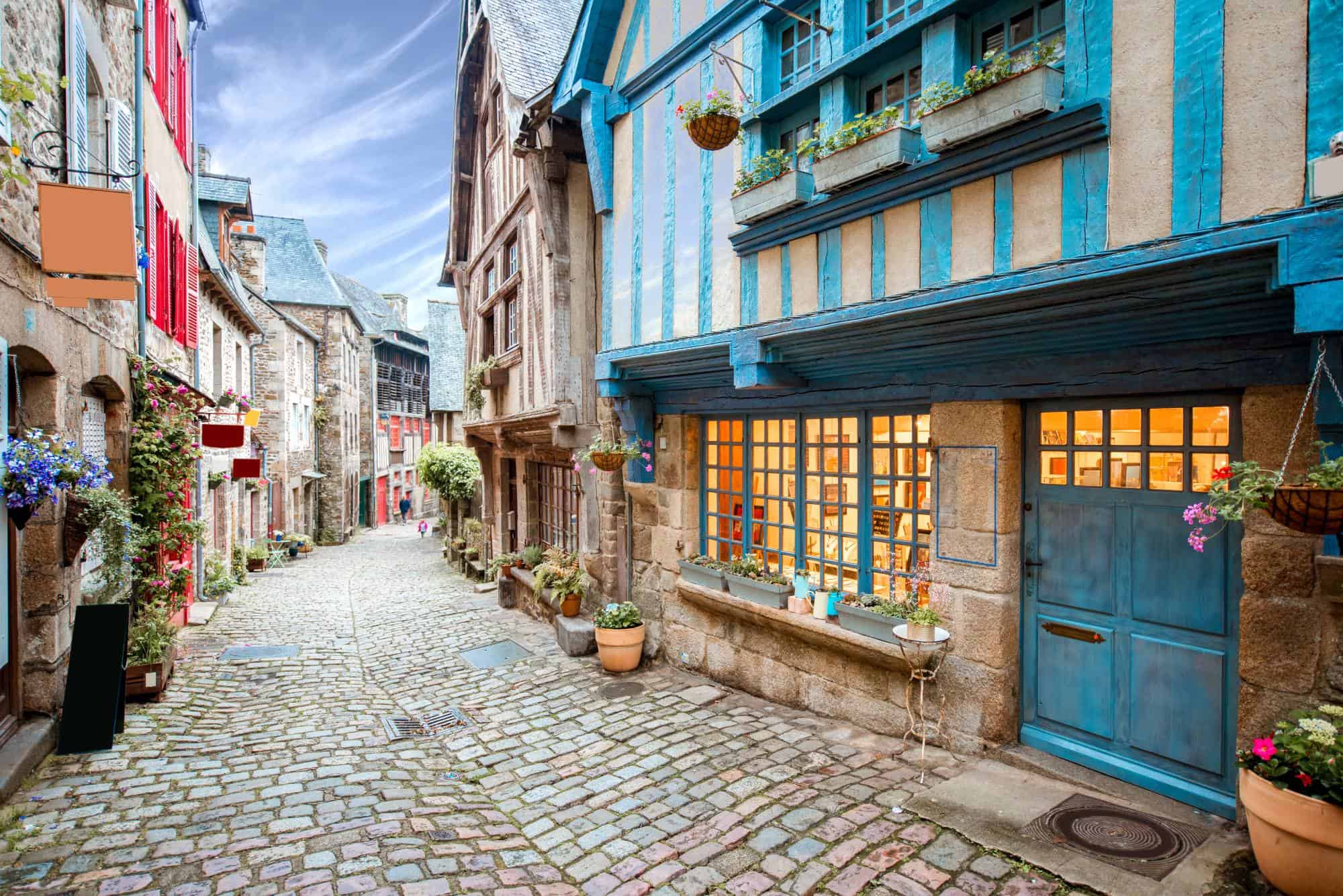
While most people speak English, it's usually for tourists. Business here is still very much done in French. If you plan on working. You need to speak French. It's how locals separate between their own lives and the lives of invading tourists.
We hope you do love crêpes
Crêpes, also known as Galettes, are a way of life here. You can eat crêpes morning, noon and night. Savoury or sweet.
And seafood
Alongside the crêpes, seafood is very popular here. Plenty of fishing villages and traditional fishermen mean oysters, mussels, and other fish are served daily. If you don't like fish, you should reconsider moving to Brittany.
And prefer cider to wine
The rest of the French drink wine at every opportunity. In Brittany, it's all about the cider. Embrace it. It's usually served in bowls (really) and can be drunk at any time of day.
Get acquainted with Breton music
Bretons are very proud of the local music scene. Most pubs have live music regularly, and concerts and street music are also very popular. Get on YouTube and look up some classical Breton music. If you can't force yourself to like it, life in Brittany could be very complicated.
Pack plenty of warm jumpers
The Brittany countryside is stunning, so outdoor activities are popular and very fun. The area gets very little rain for being so far north, but it can be very windy. You'll need warm jumpers more than you'll need a raincoat.
Don't count on career prospects
Speaking of work, most work here revolves around the tourist season and activities. If you're looking for a year-round office job, you may not have many options.
Be friendly to everyone
Brittany is the playground of Parisians who want to get away for long weekends. You'll meet as many people from Paris as you do from Brittany, so be careful what you say about the French capital!
You can find more useful tips on moving to France in our Living In France Guide For Expats.
Final thoughts on living in Brittany
The unusually warm microclimate, rugged coastline, and good food make Brittany popular year after year. The area is packed full of expats looking to enjoy life outdoors.
It's more affordable than other popular retirement destinations such as Provence or Toulouse and is positively cheap compared to living in the French Riviera.
The region has held fast to its Celtic history, meaning a strong culture separates it from the rest of France. It's truly unique and offers some of the best food, music, and countryside in France.
Brittany holds great appeal for many, and for a good reason. The only question is, where do you want to live? Wherever you choose, we recommend making sure you've got a decent local pub; it makes a big difference!
Other popular expat destinations in France to consider:
- What Is It Like Living In Burgundy, France
- Living In Provence
- Living On The French Riviera
- Living In The Dordogne As An Expat
- Living in Saône-et-Loire, France
- Living In Normandy
- Living In Auvergne-Rhône-Alpes, France As An Expat
You might find helpful:
- Living In France Guide – everything you need to know to plan your move and settle down in France
- The Best Places to Live in France – a detailed overview of France’s most popular locations for expats.
- Opening A Bank Account In France As An Expat
- Healthcare In France For Expats
- Understanding International Health Insurance: A Comprehensive Guide
- Didn’t find what you were looking for or need further advice? Comment with your question below, and we will do our best to help.
Secure Peace of Mind with Best-Value International Health Coverage
International Citizens Insurance provide free, no-obligation quotes from the leading international health insurance providers with plans tailored to meet your needs. Trusted by thousands of expats worldwide.




